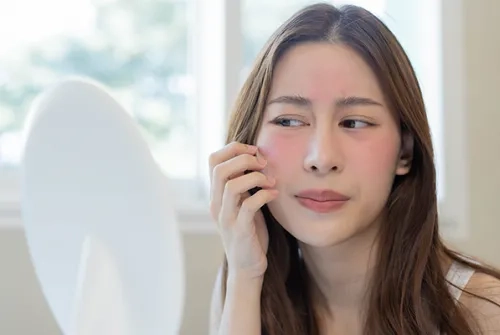Alo Yeditepe
Alo Yeditepe
What Is Rose Disease? Symptoms and Treatment of Rose Disease
"Rosacea can be controlled with personalized treatments."
Rosacea, characterized by intense redness on the face and occasionally mistaken for allergies or other skin conditions, is a common and chronic issue. Dermatologist Dr. Aliye Sevdem Gülcan, suggesting that it might be possible to effectively control its symptoms, stated, "Especially in recent times, due to the changing climate and rising temperatures, we expect to see an increase in Rosacea flare-ups. Therefore, sun protection is crucial." Dr. Sevdem emphasized that with personalized treatments tailored to the individual, the disease can be managed, providing important information on the subject.
Rosacea, commonly known as "Rose Disease," is an inflammatory skin condition that typically presents with redness and flushing attacks on the central part of the face, including the nose, cheeks, and chin. Its exact cause is unknown. Dr. Aliye Sevdem Gülcan, a Dermatology Specialist at Yeditepe University Hospitals, stated that Rosacea is observed in about 10% of the population. She also mentioned that it is more common in fair-skinned individuals with colored eyes, particularly in women aged 30-60, and is rarely seen in children. Dr. Gülcan pointed out that although it occurs less frequently in men, it tends to be more severe in male patients, adding, "Without treatment, the redness can become permanent, and there may be increased visibility and enlargement of blood vessels on the face."
"One should also avoid hot baths, saunas, and humid environments."
Dr. Gülcan, emphasizing that sunlight is the most significant trigger for the disease, provided the following information on what should be done to protect against Rosacea: "Avoiding sunlight is absolutely essential. One should also steer clear of caffeinated foods, tea, coffee, spicy and hot foods, processed foods, chocolate, chips, and cola products. Recent research has shown that dairy and dairy products can also trigger Rosacea. In addition, it's necessary to avoid hot baths, saunas, and humid environments. Another important point to consider is the use of chemical-based skincare products. Some patients who come to the clinic have used chemical products that irritate their faces and subsequently experience a Rosacea flare-up. Therefore, we should avoid products that irritate the skin and chemical peels. It's also known that stress can trigger this condition."
"It can be confused with allergies."
Dr. Gülcan, emphasizing that the disease can lead to eye involvement in advanced cases and that this problem can be confused with different diseases, continued her statement as follows:
"Rosacea can be mistaken for allergies and adult acne. In fact, because this distinction is very challenging, it can be considered normal for these conditions to be confused. People with allergies or adult acne also complain about redness rather than just those with Rosacea. When looking at the differences between these issues: the complaint of persistent redness eventually resolves in allergies and does not recur. In Rosacea, there is a constant recurrence of burning redness during attacks. If it's a chronic condition, patients should definitely revisit the doctor."
"The disease has four different clinical stages."
Dr. Gülcan, stating that Rosacea has four different clinical stages, explained, "The initial stage presents as burning, stinging, and redness attacks. In the second stage, the enlargement of capillaries is added to these symptoms. In the third stage, inflamed pimples develop. In the fourth stage, we observe thickening of the skin and growth on the nose due to chronic inflammation. Of course, this doesn't occur in every patient. Not every patient will experience all four stages. The condition known as rhinophyma, characterized by skin thickening and nose growth, is more common in male patients over the age of 50. If left untreated, the skin becomes chronically inflamed. Therefore, it's essential to consult a dermatologist."
"The diagnosis is made through a physical examination."
Dr. Gülcan explained, "We don't take biopsies; we diagnose through examination. Sometimes, we can use a dermatoscope to show demodex mites. However, the diagnosis is primarily made through a physical examination. For treatment, we can utilize medical approaches. Topical antibiotics, facial cleansing gels suitable for sensitive skin, and systemic antibiotic treatments can be beneficial. However, these topical and oral antibiotics are more effective in treating pimples or pustular lesions. If there is persistent redness on the face and increased vascularity, we strongly recommend laser treatments. In addition to that, we also use mesotherapy. We inject anti-inflammatory and redness-reducing products under the skin, including products containing niacinamide and glutathione. This can be combined with laser treatment. In essence, we achieve effective results with lasers. If the patient pays attention to their diet, avoids triggering factors, and receives laser treatment and mesotherapy, effective results can be obtained. However, Rosacea is a chronic disease. It doesn't have a completely definitive cure, but we can manage it effectively."
"Avoid acidic products and protect yourself from the sun."
Dermatology Specialist Dr. Gülcan emphasized the importance of preventing Rosacea flare-ups before they occur and provided the following recommendations on what to do and what not to do:
"One of the most important points is sun protection. Sunscreen should be used before going outdoors in every season. Taking care of your diet can also help prevent flare-ups. Especially foods containing omega-3, fish, protein, and green vegetables can be consumed. Surface chemicals and products with high acid content should not be used without a doctor's recommendation. Some patients experience flare-ups just by using these. I want to underline one more point. Especially due to the recent changes in climate and rising temperatures, we expect to see an increase in Rosacea flare-ups. Therefore, I want to emphasize the importance of sun protection once again."
This content was prepared by Yeditepe University Hospitals Medical Editorial Board.
”
See Also
- What is Shingles? Shingles Symptoms and Treatment
- Skin Rejuvenation With BBL Laser
- What Causes Skin Blemishes? How to Get Rid of Skin Blemishes?
- BBL Laser: What is Broadband Light Therapy?
- What is Fractional Carbondioxyde Laser?
- BBL Rosacea Treatment
- What is Golden Needle?, How is Golden Needle Treatment Done?
Alo Yeditepe


